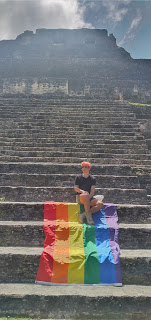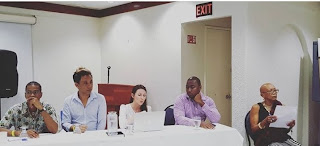Reflection of section 53 on May 7th, 2013
Posted May 17th, 2013
Chris Hamel Smith
is now my new favorite lead lawyer. On May 7th, he spent five (5) hours
noting that “from the language, spirit and intent of the constitution “ to Chief Justice Benjamin that if he pays
attention to the principles of the constitution of Belize, then the question for consideration would be,
is section fifty three of the criminal code in consistent with the constitution
and if so to what extent?”
He pointed
out that forceful carnal intercourse, in other words “rape” is different from
bestiality and that male homosexuals live as un-apprehended felons. He then
quoted a South African case where it spoke of “only in the technical sense is
this case about who penetrates whom…” ..and pointed out that status; moral
citizenship and worth of the individual matters.
Chris didn’t
discuss his revived arguments with me, prior to the court presentation, but it
was impressive to see his arguments in action. He presented to the court that
there were two worldviews in this case that can be found in the constitution.
He said that the nation is founded upon the principle of freedom of conscience
making the point the constitution allows for diverse views, and continues “The
God in the preamble is not only a Christian God,” but an individual God, a
group God that it is God in every way it matters to the conscience of a person who
seeks to obey that God. He continued to explain how the concept of diversity
was expressed in the constitution.
A minority’s morality cannot be reconciled when speaking to private
morality. Section two
Of the constitution says;
This Constitution is the supreme law of Belize and if
any other law is inconsistent with this Constitution that other law shall, to
the extent of the inconsistency, be void.
The point being made is that the framers of the constitution recognize
the existence of diverse views and sought balance with opportunity. My
analysis, is that it about respect for diversity, for difference and the world
views that allows the co-existence of various groups in the country. This is
important when the Churches argue about public morality as a justifiable reason
for infringing on others fundamental rights and freedoms. Chris further quip to
the fourth and sixth interested parties,” be not afraid,” we come here to
improve and absolutely recognize their right to hold, teach their similarly
held views.
Chris other quips pointed out that the constitution does not
allow the “force of the state to be mobilized as an instrument of evangelization,
referring to the current opposition to the criminal code by the Church. He
further pointed out to the court that freedom of expression allows for
diversity and difference of opinion, but acknowledged the limitation which
included public morality public health etc.
His presentation continued with encouraging the court to
generously interpreting the constitution. He shared too that the law“ maybe
facially neutral, but discriminating in effect”. A seeking to erode the value
of the expert witnesses and affidavits submitted to the court, he shared that
professor Bain did not have empirical evidence which supports keeping section
fifty three, that the affidavit of Philip Wright of the Anglican Church in
Belize, acknowledged “ there is a wide range of views within the Anglican
community” Furthermore, Dorrick Wright affidavit acknowledged “inherent dignity”
of gay individuals. And continued that the law itself, has no established legal
boundaries for “unnatural crime,” Belize’s jurisdiction has not clarified how
it applies to oral sex, masturbation, using a dildo or sex for non-procreation
purposes. He added that section fifty three is based in an out dated prejudice
that Belize shares with commonwealth and common law jurisdiction which points
out the foreigners of the law itself. The point made is that the outdated law
is not clear, and as such does not make for good law.
In the afternoon, he made a comparison believes section 6(1)
vs 16(1). In 6(1) all persons are equal before the law that’s broader than that
created by 16(1). To the extent to which 16(1) is broader than 6(1) is confine
to a limited class of activity. It is limited before the law and protection of
the law. 16(1) defines areas that shall be made discriminatory and constrains
where the law may go. Inclusive of this is sex, place of origin, etc. The
constitution assures individual that any violation of 16(1) that offends these
areas invites a challenge, but also establishes clause limitations.
The court would have to decide that a legitimate
justification exist for limiting right and need to determine its proper context.
Chris point out that section 6(1) offers a broader approach to the
discrimination. He establishes the court is the guardian of the constitution
and pointed out “ a good which all conducts or celebrates diversity. The
argument continued and we closed a little before 5PM.




Comments
Post a Comment